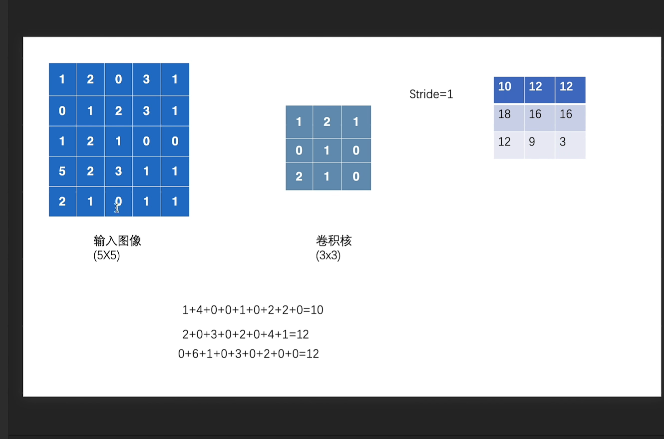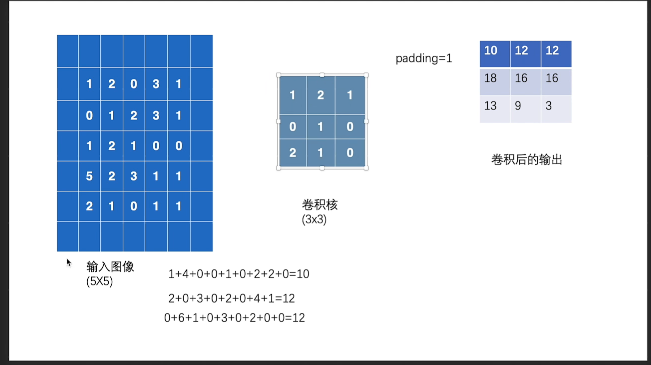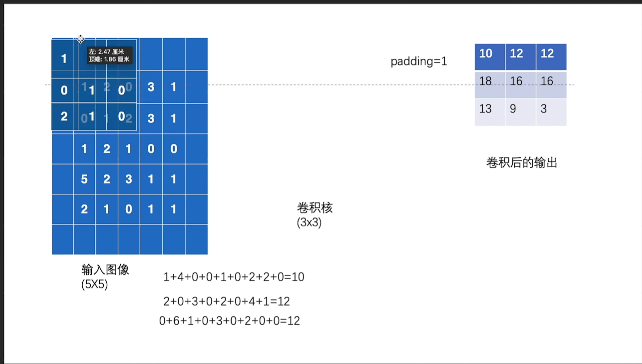简述卷积操作
卷积操作

将一个人为规定大小(3*3)的卷积核,先以左上角的输入数据重合,按对应元素做乘法运算,再将该卷积核范围内的所有乘积求和。
步长(stride 卷积核每次移动的步数) stride=1 纵向横向都是1步 stride=(sH,Sw)控制纵向横向的步长不一致。
当卷积核移动到超过边缘时,不会在进行计算。
卷积核的大小是自己设置的,卷积核上每个位置相当于一个权重w,比如一个3*3的卷积核,就是9个w,训练网络的目的就是学习这9个权值

1 # -*- coding = utf-8 -*- 2 # @Time: 2022/10/10 16:24 3 # @Author: Liu Yun tao 4 # @File:nn_conv.py 5 # @Software: PyCharm 6 7 import torch 8 import torch.nn.functional as F 9 10 input = torch.tensor([[1, 2, 0, 3, 1], 11 [0, 1, 2, 3, 1], 12 [1, 2, 1, 0, 0], 13 [5, 2, 3, 1, 1], 14 [2, 1, 0, 1, 1]]) 15 16 kernel = torch.tensor([[1, 2, 1], 17 [0, 1, 0], 18 [2, 1, 0]]) 19 ''' 20 weight – filters of shape (out_channels, in_channels/groups , kH , kW) 21 按照说明文档将输入转换成对应格式 22 ''' 23 input = torch.reshape(input, (1, 1, 5, 5)) # 通道数是1 batchsize是1 24 kernel = torch.reshape(kernel, (1, 1, 3, 3)) 25 26 print(input.shape) 27 print(kernel.shape) 28 29 output = F.conv2d(input, kernel, stride=1) 30 print(output) 31 32 output2 = F.conv2d(input, kernel, stride=2) 33 print(output2) 34 35 output3 = F.conv2d(input, kernel, stride=1, padding=1) # padding是对输入进行纵向 横向进行填充 36 print(output3)
# 输出结果 torch.Size([1, 1, 5, 5]) torch.Size([1, 1, 3, 3]) tensor([[[[10, 12, 12], [18, 16, 16], [13, 9, 3]]]]) tensor([[[[10, 12], [13, 3]]]]) tensor([[[[ 1, 3, 4, 10, 8], [ 5, 10, 12, 12, 6], [ 7, 18, 16, 16, 8], [11, 13, 9, 3, 4], [14, 13, 9, 7, 4]]]]) 进程已结束,退出代码0


padding是对输入图像进行四周行列的填充(一般默认为0)
padding = 1 时输出的尺寸会和原来输入的图像大小一致。



 浙公网安备 33010602011771号
浙公网安备 33010602011771号